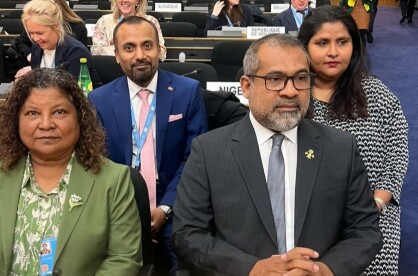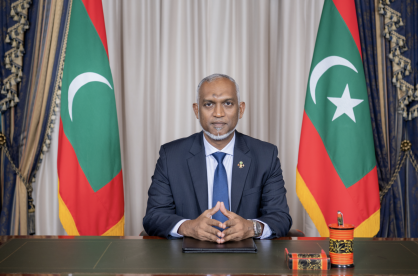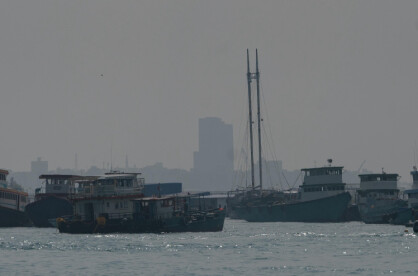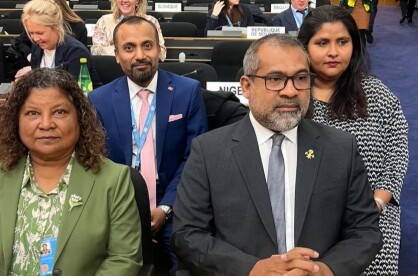Public finance in review
A look back at the nation's public finance management in 2021.

MFR Images
A look back at the nation's public finance management in 2021.

MFR Images
The year 2021 has been marked as a challenging year in terms of the Maldives' public finance management, considering that only MVR14.7 billion in revenue was raised in 2020 due to the COVID-19 related recession in the tourism industry and the overall macroeconomy. Total government debt is estimated to rise to MVR94 billion, or 122 percent of GDP, by the end of 2021.
The increasing levels of government expenditure, and the resulting consistent accumulation of debt is not entirely related to the recent COVID-19 pandemic, and the reduced revenues alone. It has been in the making since 2008, and governments have repeatedly exercised its political power to finance the annual budgets with domestic and external borrowings, lately on commercial terms. Without realising, or perhaps even knowingly, that the consequences of increased borrowing, due to the consistently increasing government expenditure, will be disastrous to the macroeconomy and that doing so will ultimately affect the democratic governance of the country.
This year can also be marked as one in which the government, and the central bank (Maldives Monetary Authority), exercised their monopoly power on printing Rufiyaa in order to finance the increased government expenditure. Again, knowing that it would also be outright irresponsible to exercise the monopoly on printing money, when the productivity in the public sector has not increased, as indicated by the increased, and irresponsible, spending on recurrent expenditure over the years.
What, one might wonder, is the alternative? "Money spent on good things is always good," remarked a former Minister of Finance. “We need to bring in credibility on what is done and what is spent”.
In a small open economy like the Maldives, with no capital controls and a pegged exchange rate, the imbalances in the macroeconomy, as a result of irresponsible macro policies can very easily be detected from the exchange rate. In this case, the rate in the parallel market.
Like always, as it has been done in the recent past even before the pandemic, we can minimize the impact on the exchange rate in the short run by bringing in foreign debt, denominated in US dollars. With increased US dollar borrowings, an ‘artificial’ boost in the reserves can be achieved in the short-run, until the debt obligations are to be honoured. Unlike the domestic debt, which can be deferred, external debt cannot be deferred easily, and it should only be relied upon for productive investments that can generate future revenue.
Again, one can only wonder whether the recent external borrowings by the government have been diverted to income generating investments. Whether the recent government financed capital expenditures would at the very least generate medium-term returns.
Statistics reported and published by the Maldives Police Service (MPS) shows that crime rates in the country has not decreased in 2021, with a 25 percent rise in theft numbers within the year, and the number of robbery cases at 348 so far this year. Taxpayers will be spending over MVR2.4 billion on both MNDF and Police salaries alone in 2022, with minimal returns to show for the staggering amounts spent.
The previous administration wanted transformational infrastructural development, mostly concentrated in the greater Malé area. The connectivity bridge between Malé, the airport and Hulhumalé; the new runway project at the Velana International Airport and the 7,000 housing units project at Phase II of Hulhumalé are major projects, and all financed through Chinese loans. The geopolitics, and the political party associations with the foreign governments dictated the criticisms by the then-opposition Maldivian Democratic Party (MDP) regarding the Chinese debt, labelling it a ‘debt trap’, and 'land grab.' Such remarks and criticism still continue, especially by the leader of MDP, and Speaker of Parliament, Mohamed Nasheed.
The ‘big brother’ of the present government is India, with over USD1.4 billion debt commitments by the Indian government, including currency swaps between the central banks. Unlike the Chinese government, the Indian government has been lenient enough to provide budget financing through short term USD treasury bills.
The most obvious approach should be expenditure reductions; which under the current political system seems an impossibility, pointing to the precarious nature of our current governance.
Capital expenditures may not be spent unto budgeted amount, mainly due to absorption capacity constraints, leading to low implementation of Public Sector Investment Program (PSIP) projects. However, recurrent expenditures fill the gap, and by the end of the year, the total budgeted expenditure is achieved.
Wider economic restructuring is required. Only fiscal policy alone cannot solve all the problems. Private sector capacity has to be increased. Time-bound production has to resume. The financial mis-match between the private sector and the public sector has to be addressed. Climate change issues need to be addressed, with bi-partisan solutions and national priorities.
None of these steps are going to be easy; especially given the current political climate. However, with a vigilant, and informed, public gatekeeping the politicians, such measures may reach some sort of fruition.



